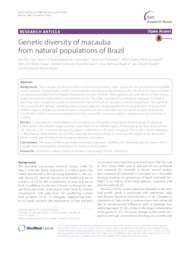Genetic diversity of macauba from natural populations of Brazil.
Genetic diversity of macauba from natural populations of Brazil.
Autoria: CONCEIÇÃO, L. D. H. C. S. DA; ANTONIASSI, R.; JUNQUEIRA, N. T. V.; BRAGA, M. F.; MACHADO, A. F. de F.; ROGÉRIO, J. B; DURARTE, I. D.; BIZZO, H. R.
Resumo: The macauba has been identified as the most promising native species for the production of vegetable oil and biomass. Several studies confirm its potential for numerous purposes (liquid and solid biofuels, food, cosmetics and pharmaceuticals), but this Brazilian biodiversity resource has been little explored, and work aimed at their domestication and genetic improvement are relatively recent. This study consisted of a multivariate approach to levels of trans fatty acids, oil yield and physical characteristics found in fruits of macauba of natural populations. The objective was to quantify the genetic variability among 35 genotypes of natural populations of macauba from 16 locations in different regions of Brazil. Euclidean Distance measurements were estimated and the cluster analysis obtained by the UPGMA method considering separately the fatty acid profile, and traits related to physical part and the fruits oil content.
Ano de publicação: 2015
Tipo de publicação: Separatas
Unidade: Embrapa Cerrados
Palavras-chave: Acrocomia Aculeata, Agroenergy, Bioenergia, Euclidean distance, Genetic divergence, Macaúba, Melhoramento genético vegetal
Observações
1 - Por padrão são exibidas publicações dos últimos 20 anos. Para encontrar publicações mais antigas, configure o filtro ano de publicação, colocando o ano a partir do qual você deseja encontrar publicações. O filtro está na coluna da esquerda na busca acima.
2 - Para ler algumas publicações da Embrapa (apenas as que estão em formato ePub), é necessário ter, no celular ou computador, um desses softwares gratuitos. Sistemas Android: Google Play Livros; IOS: iBooks; Windows e Linux: software Calibre.
Acesse outras publicações
Acesse a Base de Dados da Pesquisa Agropecuária (BDPA) para consultar o acervo completo das bibliotecas da Embrapa.

